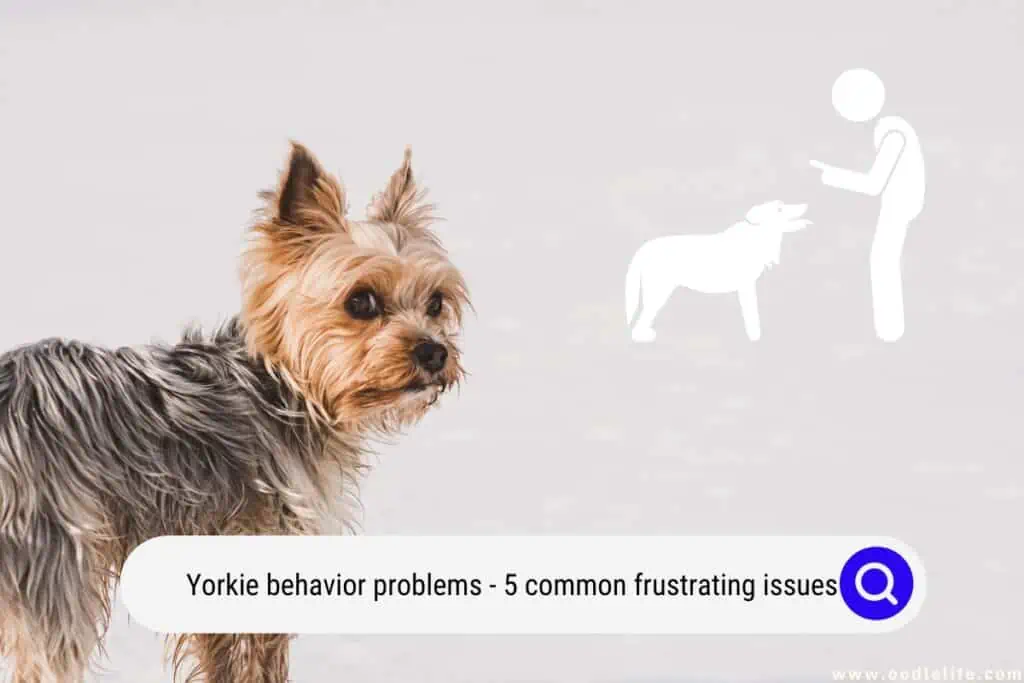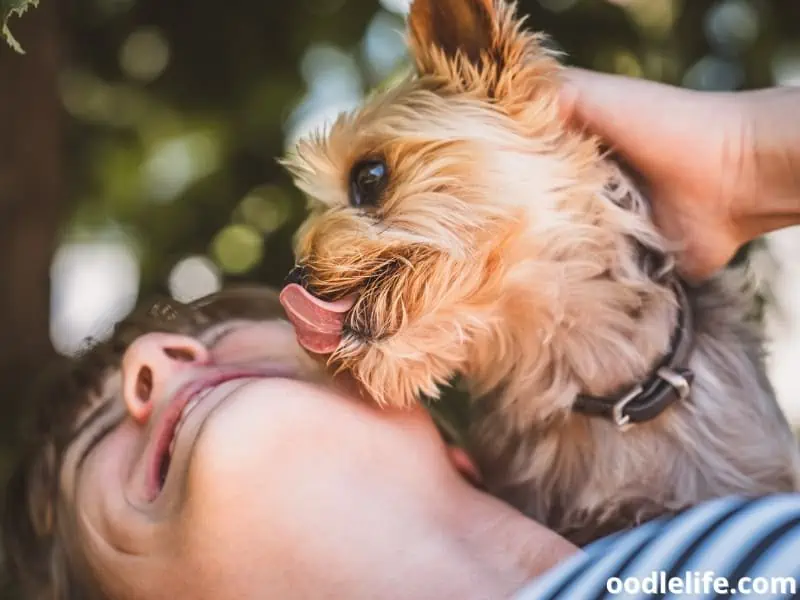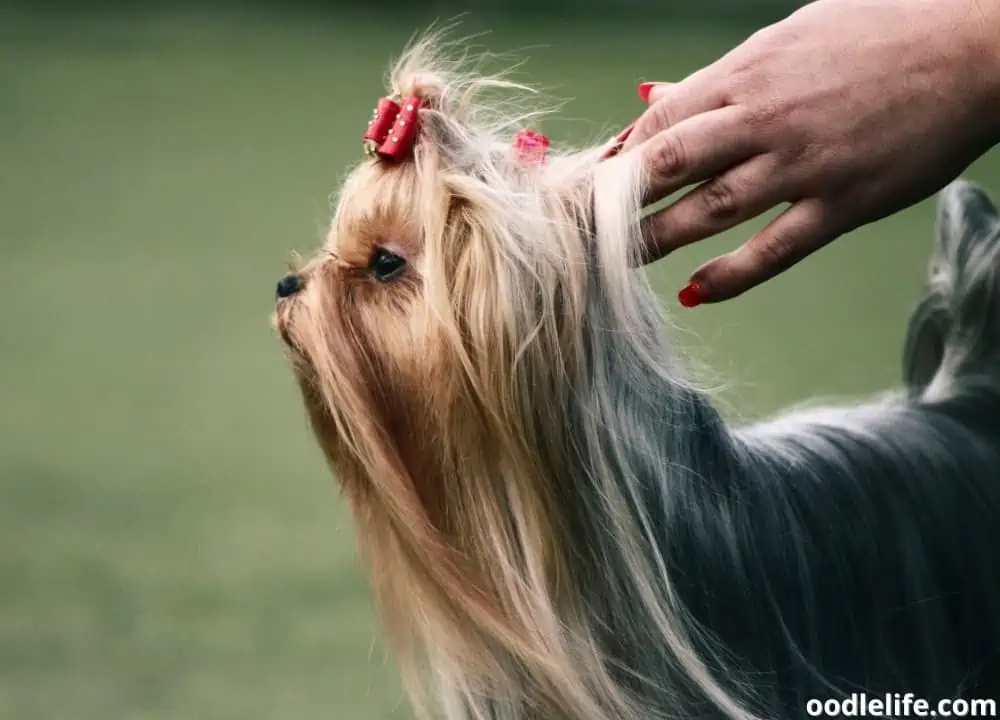Yorkie Behavior Problems (5 Common FRUSTRATING Issues)
Whether you’re only considering bringing a new furry friend into your home or have already adopted a Yorkie into your family, it helps to know what you’re getting into. Owners often run into a few common behavior problems when caring for their Yorkies, and they might help you with training and getting to know your new best friend.
The Clubs often cite the Yorkshire Terrier as one of the most popular dog breeds. Between a Yorkie’s small size and adorable looks, they seem like the ideal indoor pet, but they aren’t without their problems.
As a small family dog expert here at OodleLife, I get asked all the time about Yorkie behavior. You are not alone in having to tweak and train your Yorkie!

Here are five common Yorkie behavior problems that might help you and your furry friend. Plus, you’ll find a few tips to help you correct these troublesome behaviors if they occur.
1. Yorkies Are Notoriously Difficult to Housebreak
On average, Yorkies tend to stand only six to seven inches tall and weigh around four to seven pounds. Because of their tiny stature, their bladders are much smaller than the average dog’s, which can lead to a large amount of difficulty in house training.

On average, a Yorkie puppy must be taken outside at least every one to two hours and will be prone to indoor accidents if their owner doesn’t take them out in time. It’s best to have realistic expectations and a lot of patience with Yorkie puppies in the early stages of training.
Housebreaking remains one of the most common behavior problems in a young Yorkshire Terrier that an owner will face. The good news is that many Yorkies improve as they mature into adults.
You can take a few steps to minimize accidents and the resulting mess. First, it’s recommended that a Yorkie owner keep pee pads inside the house even after housetraining their pet to avoid any accidents that may happen. It also helps to keep an eye on how much water your Yorkie consumes during the day, as over-hydrating will lead to more accidents.
2. Excessive Barking
Yorkshire Terriers are descendants of several Scottish dog breeds, such as the Paisley Terrier and the Scotch Terrier. People bred these Scottish Terriers to be hunting dogs for chasing small game like foxes and rabbits. Consequently, Yorkies are vigilant dogs who can be very territorial and protective about their homes and families.

When startled or feeling threatened, they can be prone to excessive barking and nervousness when meeting new people or other animals, which could be disturb their owner.
Yorkies do respond to training. You have a few options for training your Yorkie to stop barking, and it might take some trial and error. Deterrents, like shake cans and squirt bottles can be effective.
You can also try teaching them a “hush” command to quell the barking. Be sure to use a physical hand motion along with the verbal signal to help your Yorkie master the commands. These signals can also be used for other commands to indicate feeding time, outside time, or any tricks that your Yorkie might enjoy learning.
It’s also important to remember that dogs have far more sensitive ears than humans. Your pup can pick up sounds that could upset or surprise them that you might not even be able to detect. Unknown sounds and noisy environments can take some adjustments, but your Yorkie should settle in with your help.
Determining a trigger for your dog’s barking is the first step. Other dogs, vacuum cleaners, sirens, and kids playing are common triggers, but you can desensitize your pup with a little practice and positive reinforcement.
3. Yorkies Are Commonly Prone to Separation Anxiety
It’s recommended that Yorkshire Terriers are kept indoors where it is safe and warm, considering that their tiny bones make them more fragile than many dog breeds. The amount of time they spend within the home often leads to a very dependent relationship with their owner.
A pet is part of your family and should always be treated with love and care. Yorkies crave entertainment and engagement for their active minds. Leaving home for short amounts of time can cause a Yorkie anxiety that will often negatively affect its behavior.
A Yorkie’s temperament can be extremely delicate, and anxiety can be caused by many things other than just absence. Like many dogs, Yorkies will often adopt some behavior problems when faced with changes in their daily schedule, excessive travel, changes in residence, and unexpected new members in the home.
Fortunately, Yorkies are known to get along very well with other dogs! If your pet struggles with separation anxiety due to unavoidable absences from the owner (such as work, school, etc.). It may be worthwhile to look into adopting a friend for your Yorkie to keep them in good spirits while you’re away from home.
Another positive aspect of Yorkies is that their small size makes it very easy to travel with your pet. Suppose a long absence from home is unavoidable. In that case, Yorkies make an excellent choice for pet owners who prefer to take their dogs out with them rather than leave them alone and potentially trigger separation anxiety in their friends.
4. Yorkies Are Picky Eaters
Due to the small size of their stomachs, a Yorkie will commonly eat only ¼ to ½ cup of food daily. Because of this, Yorkies are known to be very picky about what they eat, and owners will need to try many different types of dry and wet food to find something that their pets will enjoy.

Yorkies are also often prone to hypoglycemia, and overfeeding can be the leading cause of this issue, so it’s best to be very careful about not overfeeding your pet. A Yorkie puppy will need around three to four meals daily, and an adult should only eat twice a day to avoid any issues.
5. Yorkies Need a Lot of Attention
A standard behavior problem that people will run into when caring for Yorkshire Terriers is their high-energy and excitable nature leading them to need more attention than the average dog.

Yorkies are playful and are often suitable pets for homes with children, but they don’t like competing for attention from their owners. They’ll need a lot of affection and playtime, or they can develop an aggressive attitude that can lead to barking, biting, and chewing as they try to get the attention they crave.
Yorkies are very cuddly and love to be held. Playtime and lots of cuddling are the best ways to avoid any disagreeable moods or aggressive behavior you could run into if your Yorkie begins to feel lonely.
Yorkies Might Be Known For Their Behavior Problems, but They Also Have a Positive Side
Like with any dog, adopting a Yorkshire Terrier will come with its difficulties, but it’s important to remember that with the proper training, patience, and love, they can be a perfect addition to any family and home.

Yorkies are friendly and energetic, and with the proper care, they can commonly live up to sixteen years! This makes them a perfect choice for a long-time companion, and it gives you plenty of time to overcome any problems you might face with your Yorkie. Yorkies have big personalities for such small bodies.
Most of their behavior problems come from wanting attention and having plenty of energy they’ll need to expel during the day to remain happy and agreeable. Because of this, it’s best to keep them in homes that have plenty of toys and cozy spaces for your Yorkie to play with and explore to keep them from growing gloomy and anxious.
How To Tell if Your Yorkie Is Experiencing Behavior Problems?
If your Yorkie has grown unhappy, there are some straightforward ways to tell. Often when a Yorkie needs extra care or training, their appetites will decrease, and they might grow lethargic and sleep far more than their average amount, which is already recommended to be thirteen to sixteen hours a day.

They could also become aggressive and begin biting or nipping at their companions or growl and frequently whine to vocalize their feelings.
Final Thoughts
Although it may be true that many Yorkies struggle with some behavioral problems, they can be incredibly sweet and loving pets. Thankfully, this article should have you fully prepared to work with your new furry friend. With proper care and attention you can remedy any of these problems to make them the perfect pet for your home.
